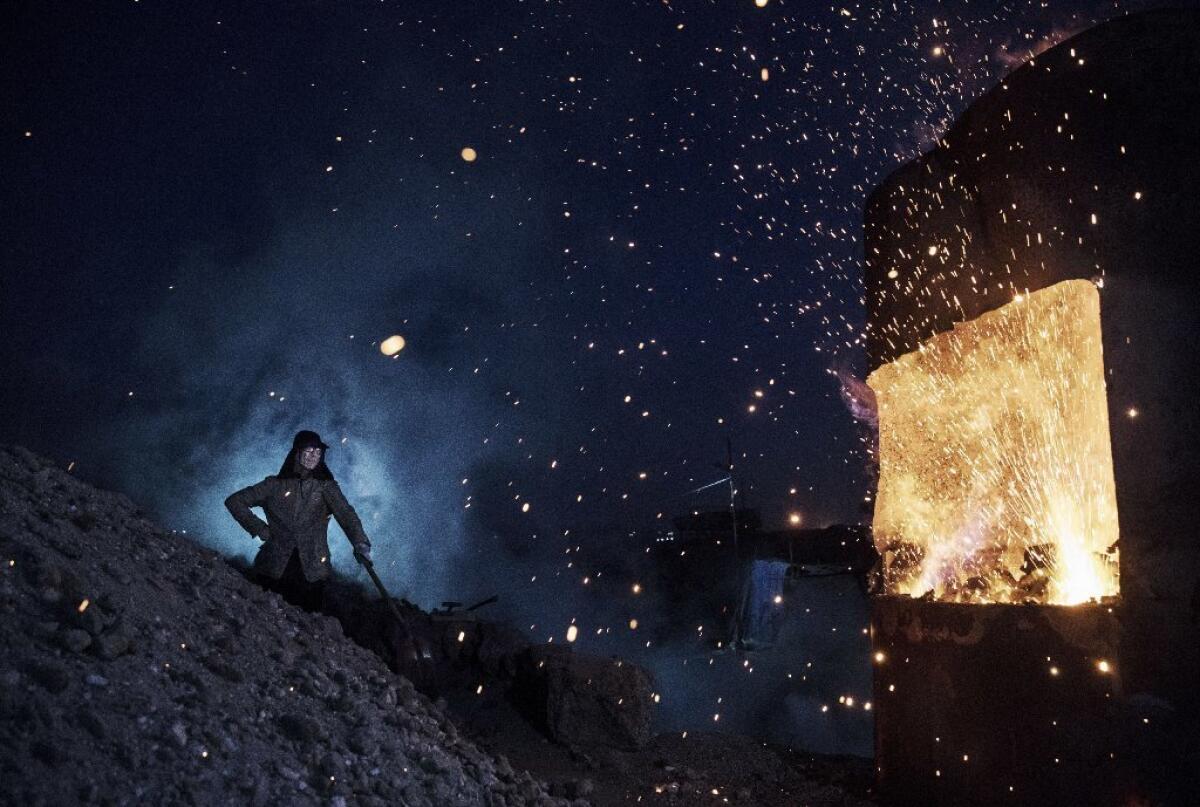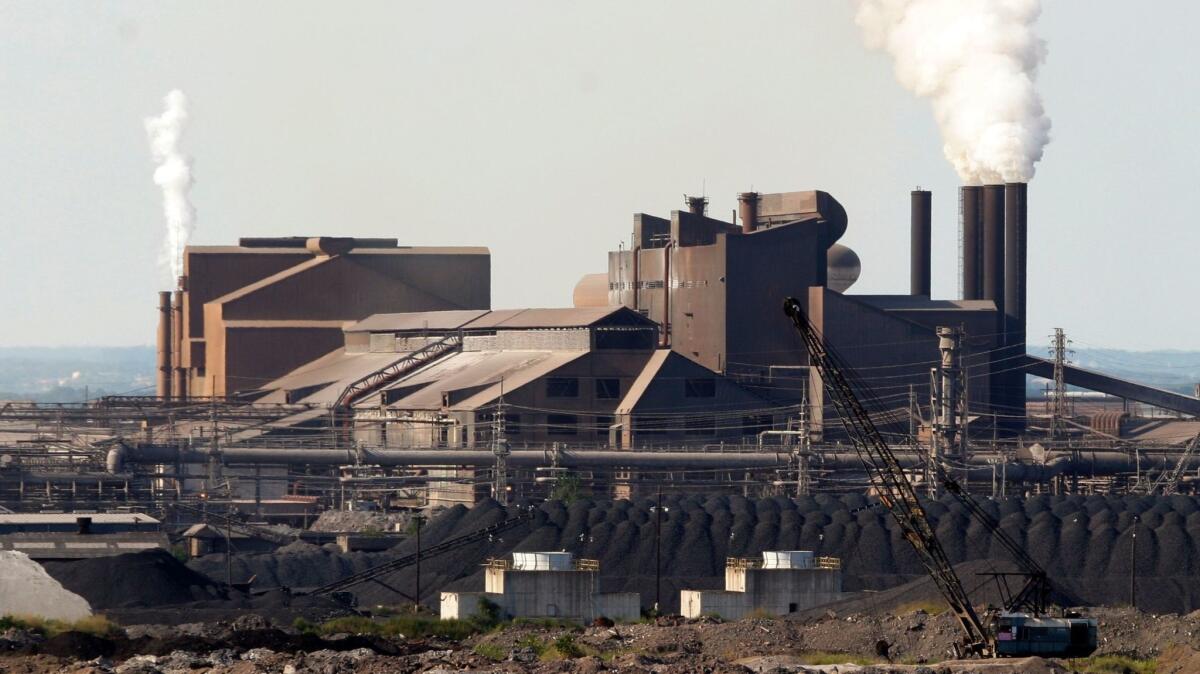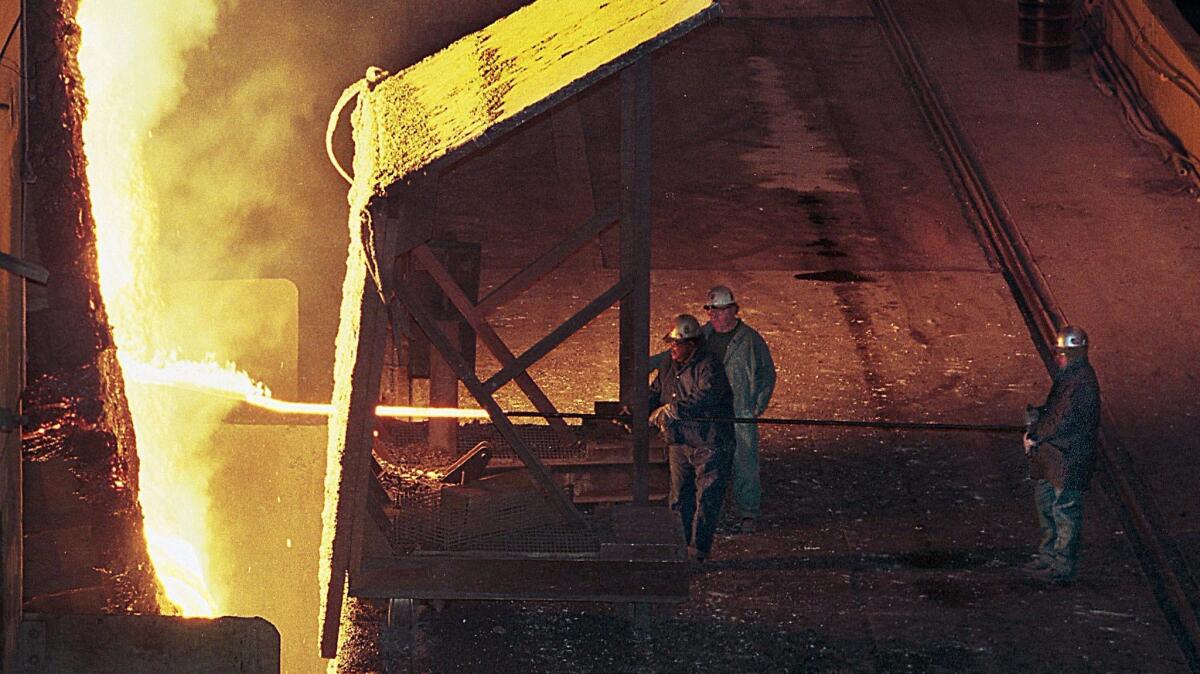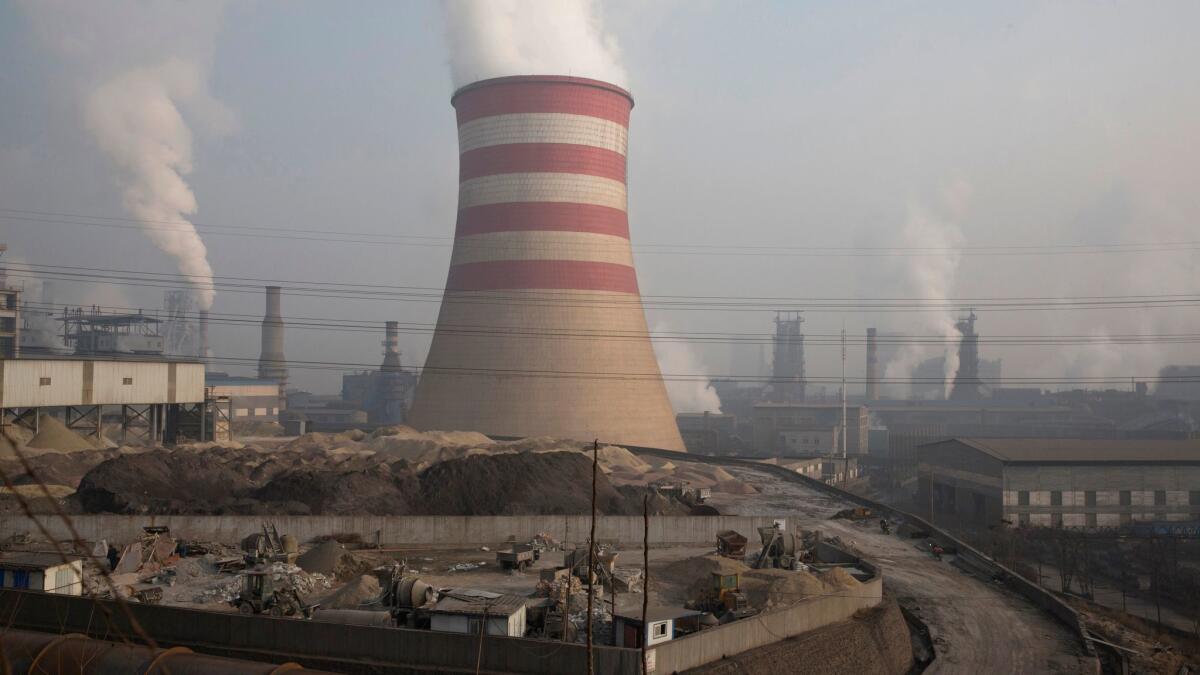Trump’s plan to slap tariffs on steel imports carries big economic and political risks

Washington — President Trump was standing on the banks of the Ohio River, and as barges loaded with West Virginia coal floated by, he noted that half the United States’ steel is produced within 250 miles and told the crowd that soon “the steel folks are going to be very happy.”
Within that same distance lies the bulk of the U.S. auto industry, which the president also has promised to protect. But carmakers are dreading what Trump apparently was alluding to: plans to impose significant punitive tariffs or quotas on steel imports.
Trump has promised to crack down on unfair foreign traders and restore the fortunes of American manufacturing. Few industries are as important as steelmaking, and Trump sees steel as an emblem of industrial power as well as being vital to the country’s national security.
But the president faces a conundrum: Making good on his Cincinnati pledge earlier this month may help domestic mills by restricting foreign steel and boosting U.S. steel prices. But that same action almost certainly will mean higher costs for American makers of cars, appliances, machinery and construction materials, and for many other manufacturers that cut, bend and otherwise fabricate steel. That could lead to higher prices for consumers and job losses.
“I’m sympathetic to American steel mills, but if they protect domestic steel, they’re going to be hurting steel fabricators, which employ a hundred times more people,” said Drew Greenblatt, chief executive of Baltimore-based Marlin Steel Wire Products, which buys only U.S.-made steel. Greenblatt has been paying more for the metal since Trump’s election, as prices have risen partly in anticipation of coming measures.
Others, such as Fontana-based California Steel Industries and the Port of Los Angeles, have voiced opposition to blanket restrictions on steel imports, saying the kinds of slab steel that are important for their businesses and employment are not readily available from domestic producers. Nor do analysts think tariffs will address the key problem — excess steel output in China that has caused a global glut and downward pressure on prices.

None of that may matter to Trump and his trade officials. Two months ago, the president ordered a study of foreign steel shipments, and its findings and recommendations could be issued as early as this week, giving him the green light to put his “America first” policy into action and remake a global trading system he thinks has undercut the U.S.
“It’ll be the first big one,” said William Reinsch, a veteran trade specialist in Washington, D.C., noting that till now, Trump’s tough talk on trade has been just that, mostly talk.
If Trump follows through as expected, history suggests U.S. steel prices will go higher, domestic steel producers will be happier and some workers laid off from mills will be called back — at least for a while. U.S. steel manufacturing has gone through waves of restructuring and is more productive today, but the industry shed 14,000 steel jobs in the prior two years, thanks to excess global production and unfair trade, according to the American Iron and Steel Institute, a trade group for 18 producer companies. The industry now employs about 140,000, the group said.
Tariffs on steel imports are nothing new, but this time, they could carry even greater political and economic risk. Trump aims to slap tariffs on steel imports, which he claims constitute a threat to U.S. national security, using a rarely invoked power granted the president under a 1962 trade law.
Steel imports accounted for about 25% of the metal used in the U.S. last year, down slightly from the prior two years. Analysts note that U.S. steel mills currently churn out more than what’s needed for the Defense Department and its programs for fighter aircraft, submarines, tanks and other military equipment.
But the Trump White House has suggested that it will be defining national security much more broadly and that ensuring the ability to make ample supplies of domestic steel is critical to safeguarding the nation’s economic security.
Commerce Secretary Wilbur Ross has said that the country has just one domestic maker of transformers, an essential part needed for the nation’s electrical grid. That constitutes a “legitimate national security issue,” he told a recent Wall Street Journal conference.
Gary Hufbauer, a trade expert at the Peterson Institute for International Economics, called the national-security provision, Section 232, the “nuclear option” as it would basically allow Trump to circumvent legal challenges under domestic trade rules. Foreign parties could bring a complaint to the World Trade Organization, but the global adjudicating body may be reluctant to intervene, given the long acceptance of a national security exception in international trade, however seldom it has been used.
Analysts worry what might happen next. Should Trump clamp down on steel imports, other countries could strike back by taking similar action on American goods. They, too, could justify such measures in the name of national security. All of that could spark a trade war and destabilize the international trading order.
“I think Europe will for sure retaliate,” Hufbauer said.

In March 2002, President George W. Bush levied tariffs of up to 30% on various types of imported steel. Like Trump, Bush had promised on the campaign trail to come to the aid of U.S. steel producers and workers who had been ailing amid rising imports and depressed prices. Bush took the action, which was supposed to last for three years, on the more common basis that a surge of imports had caused injury to the domestic industry.
U.S. steel prices rose immediately, jumping nearly 70% by mid-summer, according to data from S&P Global Platts. But Bush lifted the tariffs 16 months before they were scheduled to expire, shortly after the WTO ruled the action illegal and Europe threatened to retaliate with tariffs of its own — on citrus from Florida, motorcycles made in Wisconsin and other U.S. goods.
Bush claimed that the protective measures were a success in allowing the domestic industry to get back on its feet, but by some estimates, the steel tariffs cost some 200,000 domestic jobs in 2002, about one-fourth of them in metal-making, machinery and transportation equipment and parts sectors.
Today American farmers, among others, worry that any new steel tariffs will spill over to them. U.S. Wheat Associates, in written comments to the Commerce Department, said it was “extremely concerned” and urged the Trump administration to “consider the fallout if other countries follow suit and impose restrictions on U.S. wheat or other products as a result of their own national security concerns, whether real or imagined.”
U.S. wheat growers, like producers of corn, soybeans and other farm goods, are heavily dependent on exports and are considered particularly vulnerable in a trade war. Disruption of critical food supplies would have ripple effects globally, Wheat Associates said, suggesting that in protecting steel, the Trump administration could threaten the flow of food shipments that may be as integral to national security as steel production.
Another tough question facing Trump is how broadly would any such steel tariffs apply. Which countries would feel the sting of its measures?
Most of the steel imports come from countries that have long been among America’s closest allies, including Canada, South Korea, Japan, Germany, France, Britain and Australia. In his 2002 steel tariffs, Bush excluded Canada and Mexico, and analysts expect the same from Trump, especially as the U.S. is gearing up to renegotiate the North American Free Trade Agreement.
The U.S. already has in place some tariffs on various steel from China and some other countries, for selling products below cost or with the unfair benefit of government subsidies. As a result, steel from China accounted for just 3% of total U.S. steel imports last year, although that does not tell the whole story. Steel shipments to the U.S. from Turkey, for example, have doubled since 2013, and the American steel industry says Turkey has been buying cheap Chinese steel billets, turning them into products and then loading them onto boats to America.

It’s one thing to impose tariffs on China and even Turkey, a NATO partner, but quite another if Trump decides to apply tariffs or quotas broadly, on friends and allies alike, said Reinsch, the trade expert at the Washington, D.C.-based Stimson Center think tank.
“We’re doing this at the same time we’re trying to get Korea to make operational the U.S. anti-missile system,” he said. “We’re going to push them on steel at the same time we’re trying to get Japan to negotiate a free-trade agreement, and EU the same thing.” There will be consequences, he said.
Greenblatt, the CEO of Marlin Steel Wire, said it’s hard enough already competing with European rivals. If Trump imposes tariffs, he reckons he will be paying even more for American steel, while Germany and others may continue to buy China-made steel at a cheaper price, making it even tougher to win business in the global market.
“My heart bleeds for the steel mill guys,” he said. “But the steel fabricators are going to get their heads handed to them if everybody else buys from China.”
Follow me at @dleelatimes
ALSO
In massive shake-up, Gov. Jerry Brown breaks up California’s scandal-plagued tax collection agency
Senate GOP leaders abruptly delay vote on healthcare bill until after July 4th recess
Trump succeeds where Obama failed – spawning a new wave of liberal activism
More to Read
Inside the business of entertainment
The Wide Shot brings you news, analysis and insights on everything from streaming wars to production — and what it all means for the future.
You may occasionally receive promotional content from the Los Angeles Times.











